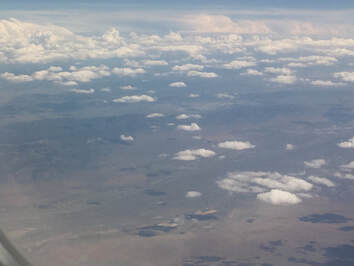 This article is bit of a divergence from my normal fare. Perhaps being in a plane, miles above the Earth, makes my thinking want a larger perspective and a longer view. So this is more of a ramble into what ifs, rather than something directly actionable. Hope you find it of interest! Just took photos of badlands while flying to Denver from San Jose. Got to wondering about the challenge of building and living in 'hostile' places like this. With the sun and wind, energy would be little to no problem. Water might be, depending on the amount needed and how effectively it was kept and reused. Rain catchment with lots of storage would be a good thing. “Water from air” devices exist. Would those sources be enough? On the space station they use about three and a quarter gallons per day per person. Clearly the technology exists. How difficult might it be to bring it down to Earth? Then there is transportation to deal with. Assuming no roads, will travel be by land or air? Hmmm. How about growing food? A greenhouse would greatly cut water use. Or perhaps there is a way to grow plankton or another tiny food source. Would an earth sheltered home be best? As long as it’s not in a place that could flood! Too much water is just as unhappy as not enough! What about communication? Could be a satellite based phone...rather than smoke signals. And would this living in the sticks, really work for an individual or family? Seems a community would be longer lived and more stable, in addition to having more useful talent available. Might be fun to see how a solar decathlon home would work so far off grid. Suppose the question of how much land would be needed isn’t very important as whatever the acreage, it probably could be had for next to nothing. Or, maybe it makes more sense to do something that’s easy to move. A portable community would be a very different design. Teepee’s are fairly portable! A bigger question is why even bother with this idea? What are the benefits of it? What are the downsides? Quality of life in a big city is certainly a question. Real quiet doesn’t seem to exist there. A bunch of people you don’t know might be riskier than being tested by a strange land. It certainly would be fun to see if any wildlife were around and how it/they would deal with the new kid on the block. Maybe tarantulas could be our new best friends! Shade, water feature, relative warmth, and whatever else, could be good ways to be a better neighbor to the locals. I prefer to think of animals, not as a resource to be exploited, but rather as individual beings who just might be willing to show us what they know and how they see the world. It's likely that humans have only a tiny understanding of the world around us and generally don’t see the full spectrum of its richness. Could this living apart be made self-supporting? What does that really mean? Earn money? One hot idea would be to focus the sun to be able to melt rock and make useful or decorative things from your homemade lava. Alexander Weygers wrote a book “The Making of Tools", years ago. He described how to build a work shop and all of the tools in it by creating a tool that could be used to build the next, slightly more complex tool. From hand tools, to power tools, and so on. Perhaps that approach would work for building a small community too. That brings us back to transportation and the question of by land or by air. Without knowing the specific piece of land and the terrain around it, we’re best off now considering air transport. How about a solar powered electric plane? Sounds good, but that would require some sort of landing strip. Better, a “fat” solar plane that would be filled with helium so that less energy was required to fly and also a much smaller landing area would be needed. Hmmm, suppose building that plane is yet another project. Let’s add the question of keeping your health, far from any doctors or hospitals. Keep a great first aid kit around? Build a holographic doctor? This is one place where having a community and a larger range of skills present, rather than just an individual or family, could be of benefit. Finally, one could look at how people can and do survive in the Antarctic or the desert, or even what thinking has gone into moon or Mars bases. Those might be productive areas to explore for ideas. Sitting in a plane is a good time for mulling ideas. Now I’m sitting in a motel room in Westford Massachusetts, where a gathering of many of the best building scientists in the Northern Hemisphere will begin tomorrow. It’s called simply, Summer Camp. Some attendees have arrived and we’ve been talking. So many of the “problems” our world currently faces, like energy supply, building durability, and affordable housing, have long ago been understood and solved. The problem is that the know-how hasn’t been spread and utilized. Fixing these problems would help fix bigger problems, like climate change and ultimately our living world’s survival. :~) Yours, Larry
0 Comments
Leave a Reply. |
Larry Weingarten
Looking back over my working life of 50+ years, it seems clear that self sufficiency has always been the best way for me to be useful. Now, mix in a strong interest in water in its many forms and the wide world of animals and you'll know what's important to me. Archives
January 2023
Categories |
Copyright © 2014 - 2023
All Rights Reserved
All Rights Reserved



 RSS Feed
RSS Feed